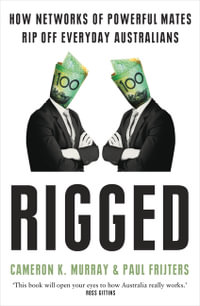When the global financial crisis hit in 2007, many commentators thought it heralded the end of neoliberalism. Several years later, neoliberalism continues to dominate policy making. This book sets out why such commentators got it so wrong, and why neoliberalism remains so durable in the face of crisis.
This book is the first comprehensive critique of the dominant 'ideas-centered' approach to understanding neoliberalism. It offers an alternative view of neoliberalism as a policy regime that is embedded in institutions, class relations and ideological norms. Damien Cahill argues that the socially embedded nature of neoliberalism explains why policy makers continue to use neoliberal policies as forms of crisis response, even though the crisis itself resulted from several decades of neoliberal restructuring. It takes aim at dominant interpretations of neoliberalism, arguing that it is wrongly viewed as reflecting neoliberal free market ideals, or as resulting from the influence of fundamentalist neoliberal intellectuals. The book concludes with a prognosis of the future prospects for neoliberalism.
The End of Laissez-Faire? is a compelling and insightful analysis of neoliberalism, which will appeal to scholars and students of public policy, political science, sociology, political economy, anthropology, human geography, industrial relations and economics-related studies.
Industry Reviews
'A book should be celebrated for its achievement if it advances knowledge, debate, and makes an indelible contribution to its field. Damien Cahill has achieved all of these merits and more in delivering the most compelling analysis of neoliberalism in The End of Laissez-Faire?. Of course, questions can always be raised about this or that aspect of any scholarly accomplishment. But the fact remains that the arguments delivered by Damien Cahill in The End of Laissez-Faire? will shape the terrain of neoliberalism studies for the coming future across the frontiers of political economy, sociology, and international studies.' -- Adam David Morton (2015): The Who of Power?, Globalizations
'The End of Laissez-Faire? On The Durability of Embedded Neoliberalism is outstanding, a thoroughly researched and most cogently argued piece of scholarship. It is highly readable and enjoyable - even as one's unquestioned beliefs are logically destroyed. Scholars who care about social justice, about societies of citizens rather than consumers, about decent standards of living - and about thorough scholarship - should read this book and ponder what is to be done.' -- Di Kelly, Journal of Industrial Relations
'Despite the global financial crisis in 2007-2008, neoliberalism has remained dominant and even informs the responses to the crisis. In his masterful analysis, Damien Cahill demonstrates that this resilience is due to neoliberalism being firmly embedded within wider class relations, institutions and ideological norms. And yet, as Cahill also argues, progressive change is possible provided it is based on large-scale political mobilisation. I most strongly recommend this book for reading.' -- Andreas Bieler, Nottingham University, UK
'In a sobering account, Damien Cahill illuminates the true nature of neoliberalism and explains why and how it has been able to survive what some of us hoped would be its terminal crisis. His concept of "embedded neoliberalism" is indispensable for understanding the connection between ideas and class power.' -- Fred Block, University of California at Davis, US
























